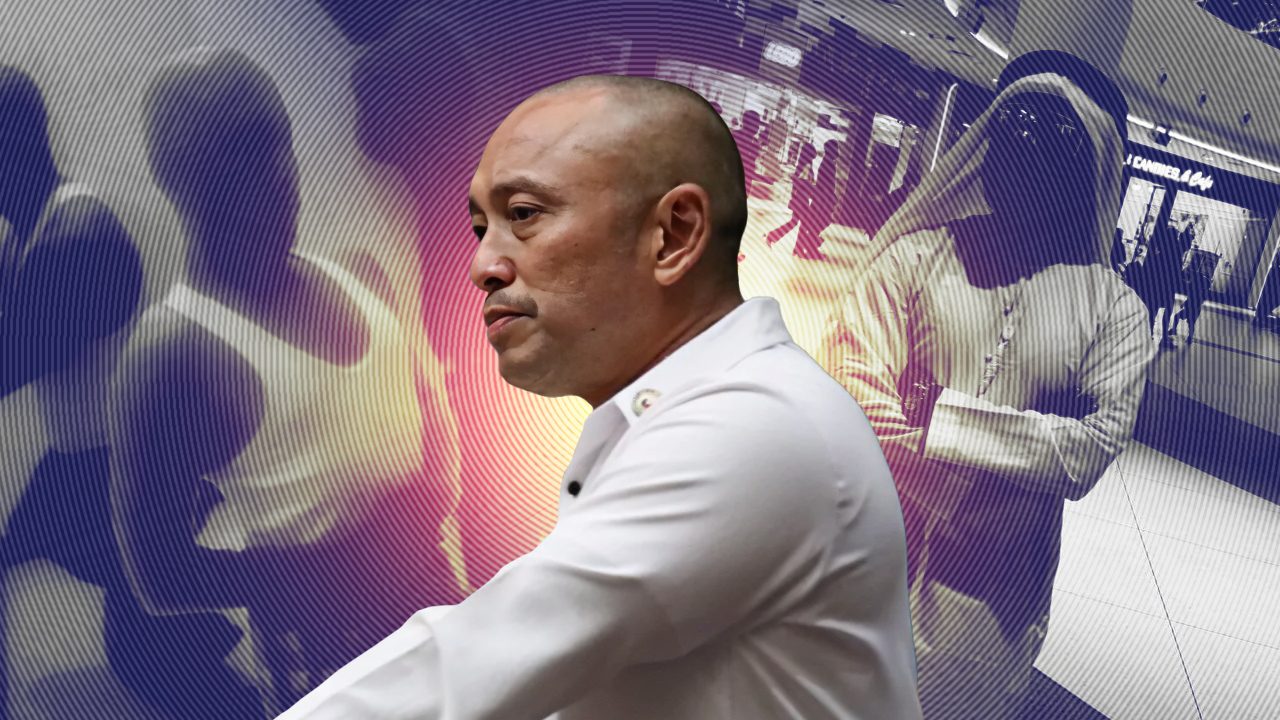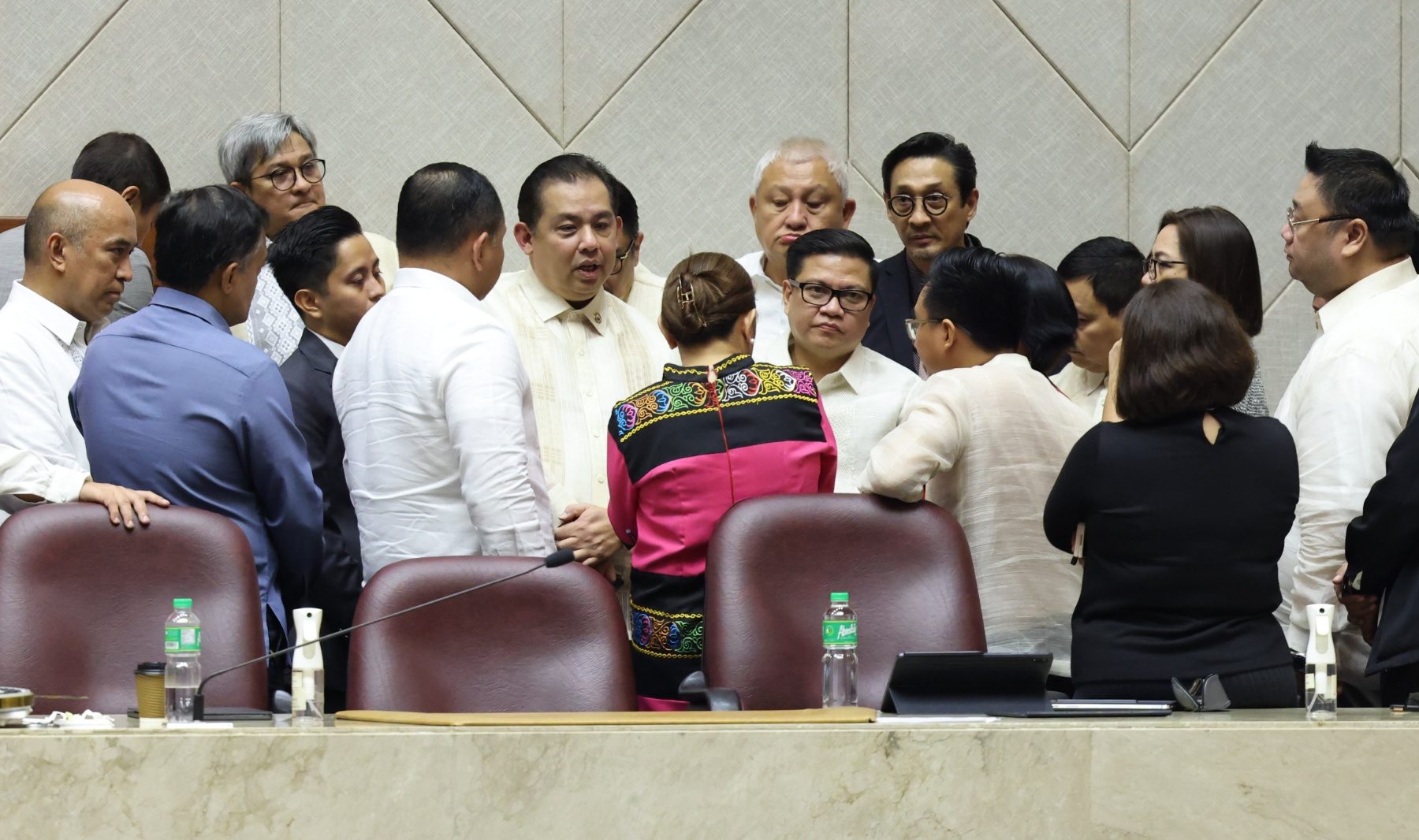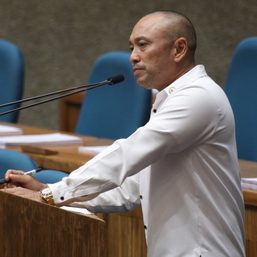SUMMARY
This is AI generated summarization, which may have errors. For context, always refer to the full article.

MANILA, Philippines – Arnie Teves’ downfall in the House of Representatives is the story of a man who, in the span of a year, went from being the chamber’s second highest-ranking leader to public enemy No. 1.
His expulsion from Congress, which even his lawyer described as “hardly unexpected,” was months in the making, triggered by a mountain of offenses.
For someone who wielded a lot of power, why did almost no one – out of the chamber’s 311 lawmakers, excluding Teves – try to save him?

Arnie’s ascent to power
Teves took a giant leap in his political career in 2016, when the then-barangay captain won the congressional race in Negros Oriental’s 3rd District, running under the banner of the Nationalist People’s Coalition (NPC).
His election victory was unsurprising, since from 1987 onwards, no one – save for the Teveses – assumed that legislative seat.
Like other politicians, Arnie jumped ship to then-ruling party PDP-Laban when he entered Congress, and allied with then-House speaker Pantaleon Alvarez.
In his first-ever privilege speech in August 2016, he said he was happy that Rodrigo Duterte won the presidency even though he did not support him, since he had fears anyway “that the Philippines was on its way to becoming a narco-state.”
“I was for very long time a drug addict. But I have been clean for the last 16-plus years,” he admitted in his speech on his proposed rehabilitation program for drug surrenderers.
The neophyte lawmaker was initially given seven committees, including the dangerous drugs panel, where he was the vice chairperson. It was an assignment not to be belittled, because it came at a time when Duterte promised to be relentless in his bloody anti-drug campaign.

Surigao del Norte 2nd District Representative Ace Barbers, a congressional veteran who has been chairperson of the dangerous drugs committee since 2016, said he did not have a hard time interacting with Teves.
“He was friendly to me, he was approachable, in my view,” Barbers told Rappler on August 18. “He was always present during our hearings because at the time, we were working on the amendments on the Comprehensive Dangerous Drugs Law.”
Rizal 1st District Representative Jack Duavit – current NPC president – also described Teves as “cheerful and helpful.”
“He was liked because he could be really funny. We never had any disagreement until the issue of why it was imperative that he return [to the Philippines],” Duavit told Rappler on August 19, referring to Teves’ continued absences in the House, one of the bases for his expulsion.
‘Frank,’ ‘eccentric’ politician
Some lawmakers, however, also noticed that Teves has a personality that veers from the conventional.
He availed of the privilege hour more often than most congressmen, delivering speeches on subjects that range from the personal to parochial – criticizing the governance of then-Negros Oriental governor Roel Degamo, calling out another lawmaker’s staff for supposed bullying tactics, and lamenting that he was not allowed to use the toilet at a terminal in Clark International Airport.
“He did not have a prepared speech, it’s often extemporaneous, and he says what he wants to say, on any topic. That’s how eccentric he is. That is one of the reasons why the committee on rules imposed a rule that if you want to deliver a privilege speech, you must note in advance your topic when you put down your name on the list,” a member of the 17th Congress, who preferred to speak anonymously, told Rappler on August 19.
“Some would look at it as him having an abrasive personality,” Alvarez separately told Rappler, also on August 19. “He really is a frank person, he’s not a hypocrite. He says things as it is even if it will not reflect well on him.”
Teves was unafraid to take his gloves off in the most heated moments, resulting in what at times would appear to be unparliamentary behavior.
One incident that captured the public eye was in September 2020, when he got embroiled in a word war with Camarines Sur 2nd District Representative LRay Villafuerte. The two accused each other of being homosexuals.
“No, he’s not my friend. In fact, we had a conflict in the past about the budget,” Villafuerte told Rappler on August 16, referring to the incident three years ago.
Still, his political capital got a substantial boost in December 2020, when he was elected deputy speaker, sharing the title with 31 other lawmakers. This was after he backed Marinduque Representative Lord Allan Velasco for the speakership, unseating his predecessor Alan Peter Cayetano, who was Villafuerte’s ally.

He did not retain that seat when the House switched leadership to incumbent Speaker Martin Romualdez. He was assigned to only four committees, none of which had him as chairperson.
Teves, however, continued to attract the spotlight because of perplexing legislative proposals, including one seeking to rename the Ninoy Aquino International Airport after former president and dictator Ferdinand E. Marcos, and another seeking to classify ghosting – the act of leaving a romantic prospect hanging – an offense.
Assassination
But his fall from grace really started when tensions in local politics spilled over into the national scene. Allegations that he masterminded the broad-daylight killing of Negros Oriental governor Roel Degamo in March proved to be detrimental to his political career.
Months before that, Arnie’s brother Pryde Henry relinquished his gubernatorial seat – which he initially won in the 2022 elections – to Degamo, who emerged the victor in a grueling electoral protest that was resolved with finality in September 2022.
Frustrated with the outcome, Teves supposedly tried to block the confirmation bid of then-acting Commission on Elections chairman George Garcia, who needed the support of lawmakers to become a permanent Comelec chief.
“He talked to each and every House contingent in the Commission on Appointments, even to the point of threatening them,” an unimpeachable source who preferred anonymity told Rappler on August 19. Teves’ camp has yet to respond to Rappler’s inquiry on his side of the story. We will update this story once we get a reply.
Ethics case
Citing medical reasons, Teves left the Philippines after getting a travel clearance from the House on February 28, days before Degamo’s death. Arrested suspects soon alleged that Teves was behind the fatal attack.
Teves became the subject of ethics proceedings, and on March 22, the House unanimously voted to suspend him for 60 days, citing his disorderly behavior when he failed to return to the country after his travel authority expired on March 9.
“There was a consensus that the Speaker is serious about maintaining the good image of the House. Because if he will not do anything about it, news reports would say, ‘What is the House of Representatives doing?'” House Secretary General Reginald Velasco told Rappler on March 30.
When the suspension expired on May 22, the same penalty was imposed on him again, plus he was booted out of his four committees. Rappler learned that some congressmen were already pushing for his expulsion at the time, so a fresh suspension order was seen as an attempt to give Teves one last chance.
Duavit – who said in a speech that Teves should interpret the suspension order as a “lifeline” – acknowledged that the NPC was among the groups that tried to delay Teves’ removal from the House.
“There were concerns. Are we going too fast? Are we doing it correctly? This is the first time it’s happened, history will judge this,” Duavit said on August 16.

D-day
The House finally pulled the plug on August 16, voting to kick out Teves in a manner that has not been seen in the august chamber since the restoration of a bicameral Congress in 1987.
The vote: 265 in the affirmative, zero in the negative, and three abstentions.
He was called to account for his continued absences, attempts to seek asylum in Timor-Leste, and indecent behavior on social media.
The vote was not smooth-sailing, having been delayed for two hours after the left-leaning Makabayan bloc questioned the inclusion of the Anti-Terrorism Council resolution against Teves in the committee report.

Believing that a “questionable body” should not have been used as a reference at all by the ethics panel, and fearing it would set a dangerous precedent, the three lawmakers from the progressive bloc chose to abstain from the vote.
Alvarez, the only person on Teves’ side, did not get to cast his vote supposedly due to a choppy signal in his province, where he was attending the plenary session virtually. He wrote to the House majority asking that his “no” vote be reflected in the official records, but it is unclear if his request would be granted.
“Other congressmen, even back in the day, had numerous absences, but were not expelled,” Alvarez told Rappler. “I [voted no] not only for congressman Teves, but also for the other members of the House. It cracks the very foundation of a republican and democratic government.”

Denial
Teves’ lawyer Ferdinand Topacio decried what he referred to as House proceedings against his client led by a “kangaroo court.”
“[With] the action of the committee, and the validation thereof by the plenary under the iron grip of a speaker hell-bent on destroying perceived political opponents, the outcome is hardly unexpected,” Topacio said on August 16.
Teves himself, however, has been silent – without a trace of activity on social media – since his lawmakers moved to kick him out.
Beyond all the noise, Teves has repeatedly insisted that all allegations against him are false. He said he cannot come home because his life would be in danger.
He denied orchestrating the killing of Degamo, and denied leading a terrorist group in the island of Negros.
“Let’s check with the Securities and Exchange Commission if a Teves Terrorist Group is registered there,” he joked on August 1. “But, seriously, there’s no such thing.”

With his back against the wall, Teves has fired in all directions, hoping something would stick.
He blamed President Ferdinand Marcos Jr. for his supposed misplaced priorities. He claimed Interior Secretary Benhur Abalos was behind the revocation of his gun license. He blasted Justice Secretary Jesus Crispin “Boying” Remulla for alleged selective justice.
Most noticeably, he burned bridges with his congressional colleagues who, he claimed, enabled the “one-sided” probe against him. He even urged them to instead look into the supposed conflict of interest stemming from the joint venture between Prime Media – the media company owned by Speaker Romualdez – and ABS-CBN, the broadcast outlet whose operations were severely paralyzed in 2020 after the House denied it a new franchise.
“First, he has to focus on defending himself rather than attacking other people. Secondly, he should come home and defend himself here, because there’s always a belief that flight is indication of guilt,” Villafuerte told Rappler.

Whether or not he’s the subject of persecution, in the end, almost no one came to rescue Teves because it simply was not in the best interest of anyone.
And “it’s never about saving anyone,” said NPC’s Duavit, who believes Teves was given fair treatment by the chamber that booted him out.
“This is not personal,” Speaker Romualdez also said on May 31, after the House suspended Teves for a second time. He has yet to issue a statement since Teves’ expulsion. “We are just doing our sworn duty and promise to the public.”
Future
Teves’ expulsion from Congress is a historic first, and the only incident comparable to this was when the House nearly expelled a Nueva Ecija lawmaker convicted of gun smuggling in 1990. That person – Nicanor de Guzman – got suspended instead, after which he resigned.
He was issued a presidential pardon in the late ’90s, and made an unsuccessful political comeback in 2004. In 2012, he died at the age of 80, with an obituary that said the gunrunner died “alone and nearly forgotten.”
His death was “in stark contrast to the media attention he got” when he was arrested for gun smuggling in 1989, that same report said.
Not all hope is lost for Teves, however, especially in a political arena that has seen dozens of embattled politicians bounce back and survive some of the most humiliating scandals of their lives.
Teves was only expelled from the House, but not yet perpetually disqualified from public office, leaving a 2025 comeback bid in the realm of possibilities.
The question is: will Teves – like De Guzman – just soon fade into obscurity, or does he have what it takes to get back on his feet? – Rappler.com
Add a comment
How does this make you feel?





There are no comments yet. Add your comment to start the conversation.